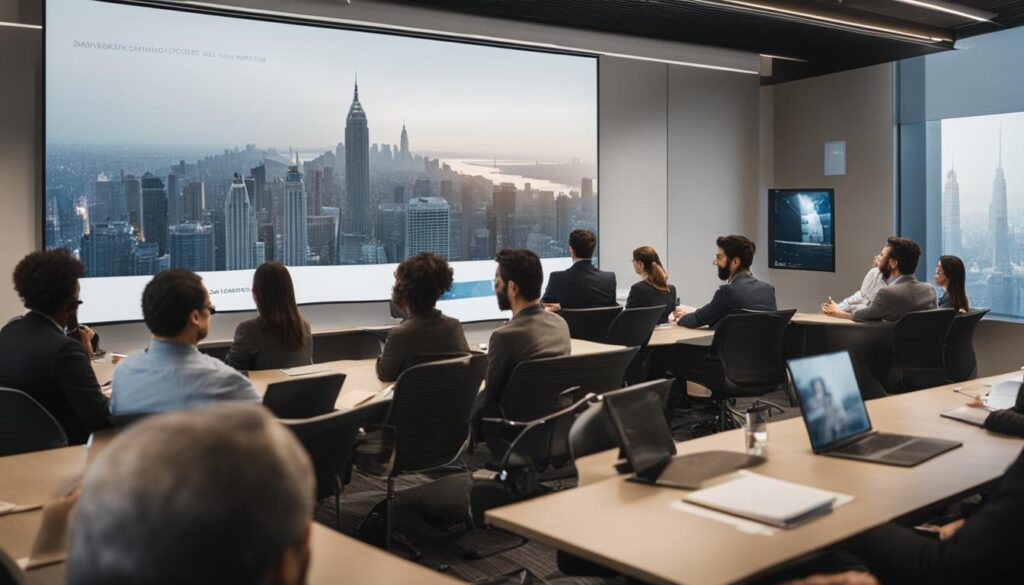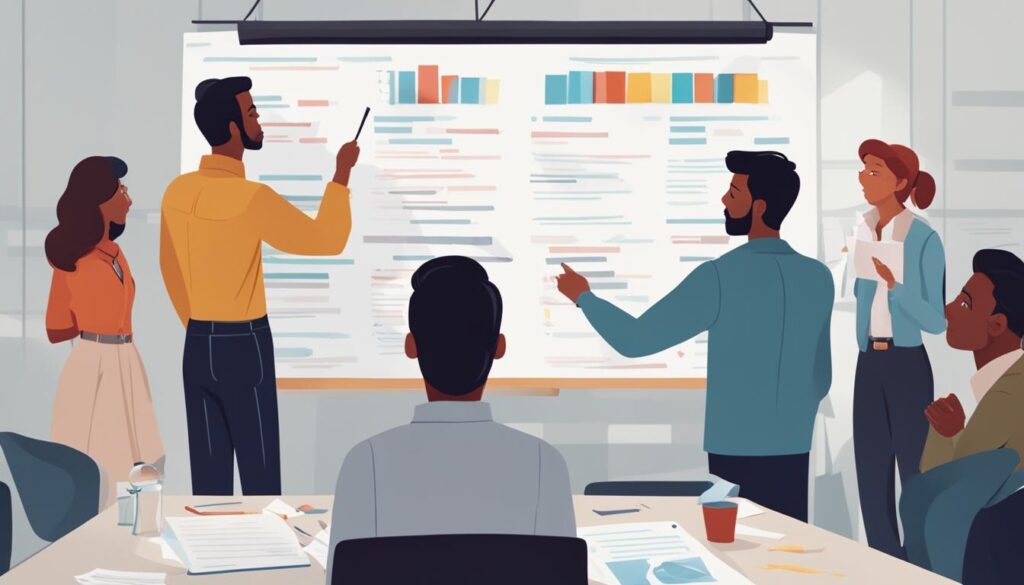We may earn money or products from the companies mentioned in this post.
Attending a seminar can be a great way to gain new knowledge, network, and grow in your industry. However, what you do after the seminar is just as important as attending it. Effective post-seminar follow-up activities can help you maximize the value of your seminar attendance, drive growth, and turn your newfound knowledge into actionable results.
In this section, we will explore the importance of post-seminar follow-up activities and discuss strategies to make the most out of seminar attendance. Learn how to develop a comprehensive post-seminar action plan, enhance attendee engagement, and create effective follow-up activities that ensure the transfer of knowledge into long-term results.
Key Takeaways:
- Post-seminar follow-up activities are essential for driving growth and maximizing the value of seminar attendance.
- Developing a post-seminar action plan is crucial in ensuring that the knowledge gained is put into practice.
- Enhancing attendee engagement through personalized communication and social media helps foster continued learning and growth.
- Maximizing learning outcomes can be achieved through effective follow-up activities, such as organizing post-seminar workshops, creating study groups, and recommending additional resources.
- Applying the strategies and best practices discussed in this article will optimize your post-seminar follow-up activities and unlock your full potential.
Developing a Post-Seminar Action Plan
Attending seminars can be an enriching experience, but the real value lies in the knowledge and skills gained through follow-up actions. A post-seminar action plan is essential for maximizing outcomes and putting learning into practice. Here are some effective strategies for developing a comprehensive action plan:
- Identify specific goals: To ensure that the knowledge gained from the seminar is put into practice, it’s essential to identify specific goals. Start by reflecting on the key takeaways from the event and considering how they can be applied in your personal or professional life. Then, set achievable goals that align with these takeaways.
- Create a list of tasks: Developing an action plan involves creating a to-do list of tasks that will help achieve your goals. These tasks should be specific, measurable, and achievable. It’s also important to set deadlines for each task to keep yourself accountable.
- Allocate resources: Ensure that you have allocated the necessary resources to achieve your goals. This may include time, money, and personnel.
- Identify potential roadblocks: Consider potential roadblocks that may hinder you from achieving your goals. By identifying these ahead of time, you can develop contingency plans to overcome them.
- Track progress: Keep track of your progress to ensure that you are on track to achieve your goals. You may consider using a project management tool or a simple spreadsheet to track progress and ensure that you’re staying accountable.
By following these strategies, you can create an action plan that will help you maximize the value of your seminar attendance. Remember to keep your action plan realistic, flexible, and adaptable. With the right follow-up strategies in place, you can achieve your goals and make meaningful progress towards growth and success.
Enhancing Seminar Attendee Engagement
Engaging with seminar attendees after the event is critical to foster continued learning and growth. Follow-up initiatives help build a strong network and maintain connections. Here, we explore the most effective follow-up tips to enhance engagement with attendees and maximize the seminar’s outcomes.
Personalized Emails
Sending personalized emails is a great way to maintain contact with attendees. Use the email to thank them for attending the seminar, recap the key takeaways, and provide relevant resources to continue their learning. Personalizing emails with the attendee’s name and mentioning their interests from the seminar conveys that their presence was valued and encourages feedback.
Surveys
Surveys are an effective way to receive feedback and understand attendees’ needs better. They can provide valuable insights that can be used to improve future events. Make the survey short and straightforward, with open-ended questions that allow attendees to share their thoughts genuinely. Provide an incentive to encourage attendees to fill out the survey.
Social Media Platforms
Use social media platforms such as Twitter, LinkedIn, or Facebook to continue the conversation after the seminar. Create a group for attendees to network, connect with speakers, and share resources. Encourage attendees to share their opinions, ask questions, and engage in discussions. It will help create a community that values learning and growth.
Webinars
Webinars are an excellent way to continue engaging with attendees after the seminar. Host webinars that reflect the seminar’s topics and provide attendees with additional knowledge and resources. Encourage the attendees to ask questions during the webinar and to share their insights. Provide a recording of the webinar to attendees who can’t attend live for future reference.
Maximizing Learning with Follow-up Activities
After attending a seminar, it’s essential to apply the newly acquired knowledge by organizing effective follow-up activities. Follow-up activities play a vital role in maximizing the learning outcomes of a seminar and ensuring continuous growth.
Effective Follow-up Activities
Here are some effective follow-up activities:
- Organize post-seminar workshops: Post-seminar workshops provide an excellent opportunity to delve deeper into the seminar’s key concepts and discuss real-world applications. Consider inviting speakers or industry experts to facilitate the workshops and encourage attendees to share their experiences.
- Create study groups: Study groups are a great way to foster ongoing learning and knowledge sharing. Encourage attendees to form study groups and discuss the seminar’s key concepts, share their experiences and learning outcomes, and support each other in applying the knowledge gained.
- Recommend additional resources: Provide attendees with additional resources, such as books, articles, or podcasts, to complement the seminar’s content. These resources help attendees deepen their understanding of the seminar’s subject matter and facilitate ongoing learning and development.
Follow-up Best Practices
Follow-up activities must be well-organized, engaging, and focused on facilitating ongoing learning and growth. Here are some best practices to help you design effective follow-up activities:
- Develop a clear follow-up plan: Develop a clear follow-up plan that outlines specific goals, tasks, and timelines for implementing the seminar takeaways. The plan should be comprehensive and aligned with the seminar’s subject matter.
- Facilitate ongoing communication: Maintain ongoing communication with attendees through various channels, such as emails, social media platforms, or online forums. Encourage feedback, facilitate discussions, and provide additional resources to promote ongoing learning and growth.
- Create a supportive environment: Create a supportive environment that encourages attendees to share their experiences, ask questions, and apply the seminar’s concepts in their daily work. Encourage attendees to support each other and build a strong network within the industry.
Seminar Attendee Engagement
Engaging with seminar attendees after the event is essential for fostering continued learning and growth. Here are some strategies to enhance attendee engagement:
- Personalized emails: Send personalized emails to attendees, thanking them for attending and providing additional resources or follow-up activities.
- Surveys: Conduct surveys to gather attendee feedback and insights. Use the feedback to improve the seminar’s content and design future events.
- Social media platforms: Use social media platforms to facilitate ongoing conversations and knowledge sharing among attendees. Encourage attendees to ask questions and share their experiences and insights.
By implementing effective follow-up activities, best practices, and attendee engagement strategies, you can maximize the outcomes of your seminar attendance and ensure the knowledge gained translates into meaningful results.
Conclusion
Incorporating effective post-seminar follow-up activities is critical for achieving growth and increasing the value of seminar attendance. By developing a post-seminar action plan, enhancing attendee engagement, and maximizing learning opportunities, attendees can apply the newly acquired knowledge and skills effectively.
Take Action
To optimize post-seminar follow-up activities, begin by identifying specific goals and outlining actionable steps to achieve them. Utilize personalized communication methods to foster relationships with seminar attendees and encourage feedback and discussion. Apply the best practices and strategies discussed in this article, such as organizing post-seminar workshops and creating study groups to enhance the learning process further.
Unlock Your Potential
The true value of attending a seminar is in the application of the knowledge gained. The success of your seminar participation lies in your ability to apply this knowledge. By implementing effective post-seminar follow-up activities, attendees can maximize their learning outcomes and unlock their full potential, gaining a competitive edge in their industry.
FAQ
What are post-seminar follow-up activities?
Post-seminar follow-up activities refer to the actions taken after attending a seminar to maximize the learning outcomes and engage with seminar attendees. These activities can include developing an action plan, enhancing attendee engagement through communication methods, and organizing additional learning opportunities.
Why are post-seminar follow-up activities important?
Post-seminar follow-up activities are crucial because they help reinforce the knowledge gained during the seminar, facilitate networking and collaboration among attendees, and ensure that the information learned is applied effectively in real-world situations. These activities contribute to continued growth and professional development.
How can I develop an effective post-seminar action plan?
Developing an effective post-seminar action plan involves outlining specific goals, tasks, and timelines for implementing the knowledge gained. Start by identifying the key takeaways from the seminar, determine how they can be applied in your work or personal life, and create a detailed plan with actionable steps. Regularly review and update the plan to track progress and make any necessary adjustments.
What are some strategies for enhancing seminar attendee engagement?
To enhance seminar attendee engagement, you can utilize personalized emails to provide follow-up information and resources, conduct surveys to gather feedback and suggestions, and utilize social media platforms to facilitate ongoing discussion among attendees. By maintaining open lines of communication and fostering a sense of community, you can encourage active participation and collaboration.
What are some effective follow-up activities to maximize learning outcomes?
There are several effective follow-up activities that can maximize learning outcomes. These include organizing post-seminar workshops or webinars to further explore seminar topics, creating study groups or discussion forums for attendees to continue learning and exchanging ideas, and recommending additional resources such as books, articles, or online courses that expand on the seminar content. These activities provide opportunities for deepening understanding and application of the knowledge acquired.
Affiliate Disclosure: This post may contain affiliate links. If you purchase through our link, we may receive a small commission, but at no additional cost to you. For more information, please see our Disclosure statement.



